Official unconsciousness. Why Bulgaria is betraying Russia
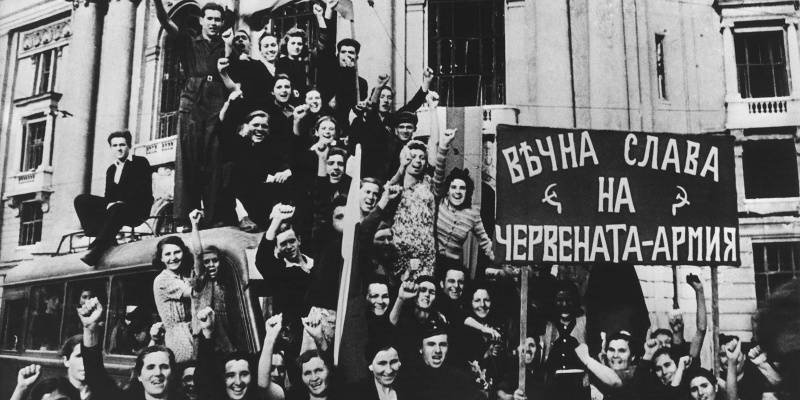
How Russia freed Bulgaria from the Turkish yoke
Russians and Bulgarians have long-standing national, cultural, linguistic and spiritual ties. Few people now remember that during the time of the Russian prince Svyatoslav Igorevich (the Grand Duke of Kiev in the 945-972 gg.) Rus-Russians and Bulgarian-Slavs were almost one people. When the soldiers of Svyatoslav fought in Bulgaria, they were almost no different from the local population. The Bulgarians recently adopted Christianity, and pagan cults (including the cult of Perun) were still fresh in the countryside, language, spiritual and material traditions were one. Russes and Bulgarians belonged to the same ethnocultural and linguistic community. It is not surprising that Svyatoslav himself planned to transfer the capital of Russia to the Danube, to Bulgaria.
This deep feeling of belonging to a single people was traced also afterwards. Ordinary Bulgarians always felt like Russian brothers. In the 1380 — 1390 years, a long period of Ottoman occupation began. Ottoman Turks occupied most of the Balkan Peninsula, including weakened by previous wars and fragmented Bulgaria. A difficult time came for the Slavs and Christians of the Balkans - the Turkish yoke. Christians were greatly curtailed in their rights and freedoms, taxed heavily. Including the “blood tax” when the Turks took the boys to serve in the Janissaries corps. Young men were brought up by Muslims, forgot their national and religious roots, became cruel enemies of their fellow countrymen. At the same time, the Slavs were forbidden to live in certain lands, a policy of Islamization and consecration was pursued.
It is not surprising that the Slavs, including the Bulgarians, repeatedly revolted, tried to resist. Local partisans fought against the Turks - Hajduki, Chetniks. However, all revolts were drowned in blood. Without external support, the local national liberation movement had no chance. The real hope of liberation among the Balkan Slavs and Christians appeared only with the growth of Russia's power. The Russian Empire waged a tough battle with Turkey for supremacy in the Black Sea, the Caucasus and the Balkans. Step by step, the Russians squeezed a strong enemy, carried liberation to the Balkan peoples. Tens of thousands of Russian soldiers laid their heads to free the Balkans from Turkish rule.
The freedom of most of Bulgaria was brought by the Russian-Turkish war 1877 — 1878. In 1875, the Serbs of Bosnia revolted. In 1875 — 1876 anti-Turkish uprising began in Bulgaria. It was most brutally suppressed by the Ottomans. Tens of thousands of Bulgarians were killed, robbed and raped by the Turks and their irregular formations (Albanians, Kurds, etc.). Russian society, which always painfully perceived the oppression of the Balkan Slavs and Christians, was deeply outraged. Russian volunteers traveled to the Balkans to fight the Turks, public organizations, the church and newspaper editorial offices raised funds to help refugees. Serbia and Montenegro opposed Turkey in 1876. Serbia suffered a severe defeat and was saved only by Russia's tough stance.
Official Petersburg, which was traditionally cautious, fearing a shout from the West (in addition, military reform had not yet been completed, the economy was not in the best position), for some time tried to exert diplomatic pressure on Constantinople. Under pressure from the European public, frightened by the massacres in Bulgaria, England and France also demanded reform from Turkey. In December 1876, Russia demanded that Turkey recognize the autonomy of Bulgaria and Bosnia under the control of world powers. The Turks ignored this demand.
In 1877, Russia opposed Turkey. The war was hard. The Russian army was unable to immediately force the Balkan Mountains, stuck in a siege of Plevna. Nevertheless, the Russian army, with the support of volunteers from the Bulgarians, Romanians and Serbs, managed to free Romania and Bulgaria from the Turks. The advanced Russian forces, led by Skobelev, reached Adrianople and were on the outskirts of Istanbul. In fact, the Russian army could occupy Constantinople and completely solve the issue of the liberation of the Balkans from Turkish rule. However, Petersburg is again (as in the 1829 year: “Our Adrianople! Why the Russian army did not take Constantinople ") did not dare to take Constantinople and put an end to the centuries-old historical confrontation with Turkey. Fear of the West played a key role. Petersburg feared that Austria, France and England would come out against Russia, as during the Crimean War. Although the German Empire, where Bismarck ruled, at that time hinted that it would support Russia in exchange for the possibility of resolving the French question. It was a reasonable exchange.
3 March 1878 g. (19 February old style) was signed the San Stefano Peace Treaty. Turks recognized the independence of Serbia, Romania and Montenegro. Serbia and Romania were significantly expanded. Bosnia and Herzegovina became autonomy. Bulgaria became an autonomous principality, at first under Russian rule and only formally dependent on Turkey. Bulgaria included ethnic Bulgarian territories in Moesia, Thrace and Macedonia. As a result, Bulgaria extended from the Danube to the Aegean Sea, from the Black Sea to Lake Ohrid. Turkey paid indemnity to Russia and ceded a number of territories in the Caucasus and Europe. 3 March became a national holiday in Bulgaria - Day of the liberation of Bulgaria from the Ottoman yoke. Later, hundreds of monuments were erected in Bulgaria in honor of the Russian liberators. Including the Freedom Monument at Shipka Pass, in memory of the Russian soldiers who died for the liberation of the fraternal Bulgarian people.
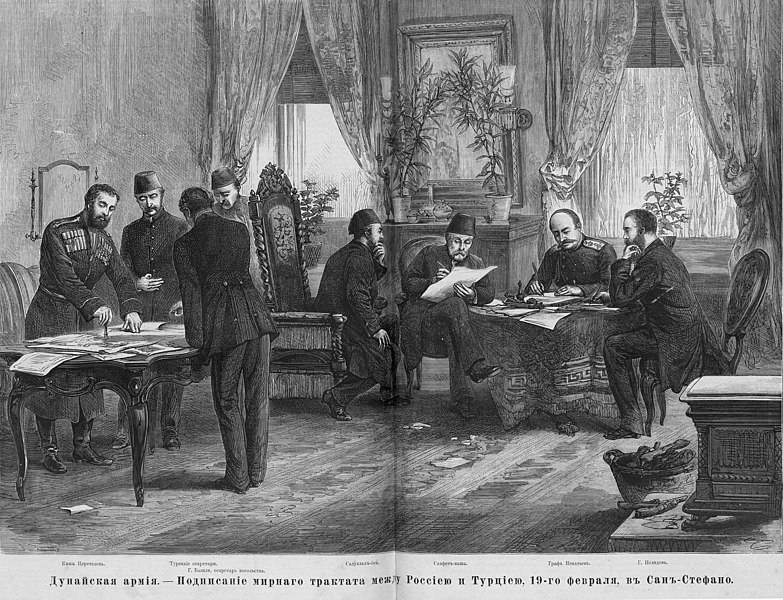
Stolen victory
However, the "enlightened West" opposed this agreement, especially England, which moved the fleet to the Dardanelles, and Austria-Hungary. London and Vienna did not want to strengthen Russia's position in the Balkans, where Russia could get a powerful strategic bridgehead and access to the Mediterranean Sea through its ally Bulgaria. Under pressure from the West, St. Petersburg lost, the fruits of the Russian victory were partially stolen. On July 1 (14) the Berlin Treaty was signed, which was the result of the work of the Berlin Congress, convened at the initiative of the Western powers to revise the terms of the San Stefan Treaty to the detriment of Russia and the Slavic peoples of the Balkan Peninsula.
Bulgaria was divided into three parts: an autonomous principality from the Danube to the Balkans with its center in Sofia (formally a vassal of Turkey); Bulgarian lands south of the Balkans formed the autonomous province of the Turkish Empire - Eastern Rumelia with a center in Philippopolis; Macedonia - lands to the Adriatic and the Aegean were returned to the Turks without any changes in status. The independence of Serbia, Montenegro and Romania was recognized, but the territorial acquisitions of Serbs and Montenegrins were curtailed. Austria-Hungary received the right to occupy Bosnia and Herzegovina. Russia had to abandon some of the acquisitions in the Caucasus. A number of contradictions inherent in Berlin became the prerequisites for future Balkan wars and the First World War.
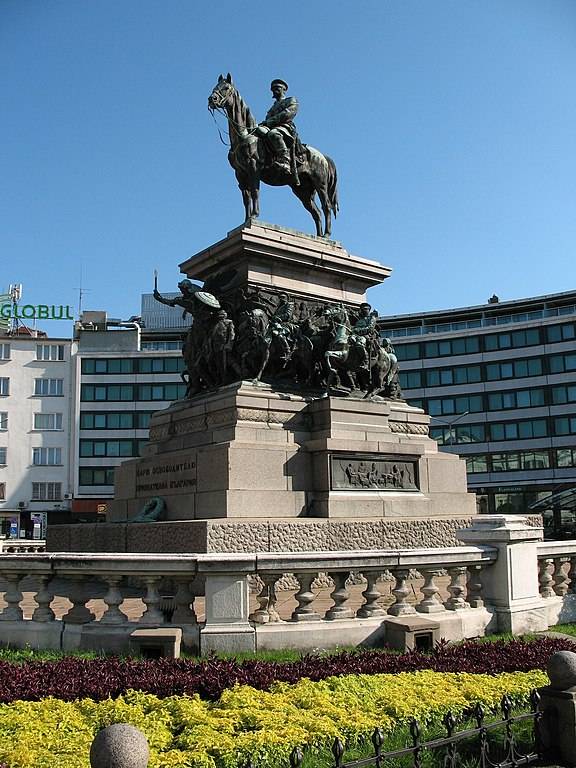
Bulgaria on the side of the Germans
Later, at the proposal of the Russian Emperor Alexander II, Bulgaria was headed by the nephew of the wife of the Russian sovereign Maria Alexandrovna Alexander Battenberg (1879 — 1886) from the German Battenberg dynasty, then Ferdinand I (1887 — 1918) from the Saxe-Coburg-Gotha dynasty. Bulgaria with the consent of Russia, Germany and Austria-Hungary in 1885 merged with its western part (Eastern Rumelia), in 1908 it declared itself completely independent and became a kingdom.
Russia liberated Bulgaria, but could not attach it politically, economically, and even culturally. Sofia is gradually leaning towards Vienna, Berlin and Paris. The Germans and the French finance the country's economic development, in particular, the construction of railways. Relations with St. Petersburg are deteriorating, up to the severance of diplomatic relations, which were restored only in 1896.
Bulgaria, with the support of Austria-Hungary, Germany and France, is preparing for a war with Turkey over Macedonia. Macedonia has also become a disputed territory for Bulgaria, Serbia and Greece. During the First Balkan War 1912 — 1913, the Balkan states defeated Turkey and took its European possessions from it, but then fought for production. Serbia and Greece entered into an alliance against Bulgaria. Germany and Austria-Hungary invaded Bulgaria on the Serbs. In the summer of 1913, Bulgaria launched a war against Serbia. Against Bulgaria, Montenegro and Greece, and then Romania and Turkey, came out to profit at the expense of the Bulgarians. Sofia lost the war, was territorially circumcised and humiliated. This shame and thirst for revenge finally pushed Bulgaria into the arms of the German bloc. Serbia became the number one enemy for Sofia. In World War I, Bulgaria sided with the German bloc. Her performance in 1915 led to the rout and occupation of Serbia.
Bulgaria was defeated along with Germany. The Neuilly Treaty of November 27, 1919 became a heavy burden for the country. Bulgaria curtailed in favor of Serbia, Greece and Romania, deprived of access to the Aegean Sea. I had to pay a contribution. Bulgarian weapons reduced to a minimum, canceled the draft, banned from having Aviation and heavy weapons. Not surprisingly, in the 20s, the extreme right-wing (fascist) regime of Tsankov was established in Bulgaria, which carried out repressions against communists and socialists. At this time, Sofia was able to build good relations only with fascist Italy. In the second half of the 1930s, Sofia began to lean toward an alliance with the Third Reich. Economic and military cooperation with Germany developed. With the outbreak of World War II, Sofia became an ally of the Reich. Under pressure from Berlin, Romania returned the southern Dobrudja to the Bulgarians.
In 1941, Bulgaria signed the Triple Pact (the union of Germany, Italy and Japan), but did not participate in hostilities. The Bulgarian territory was used by the Nazis to invade Yugoslavia. Bulgarian troops occupied Western Thrace, Macedonia and Western territories. In December 1941, Sofia declared war on the United States and England, but until the end of the war she tried to maintain peace with the USSR. At the same time, the Germans used the transport infrastructure of Bulgaria (airports, seaports, railways and highways) for military purposes, and the Bulgarian troops were used to occupy the territories of Yugoslavia and Greece.
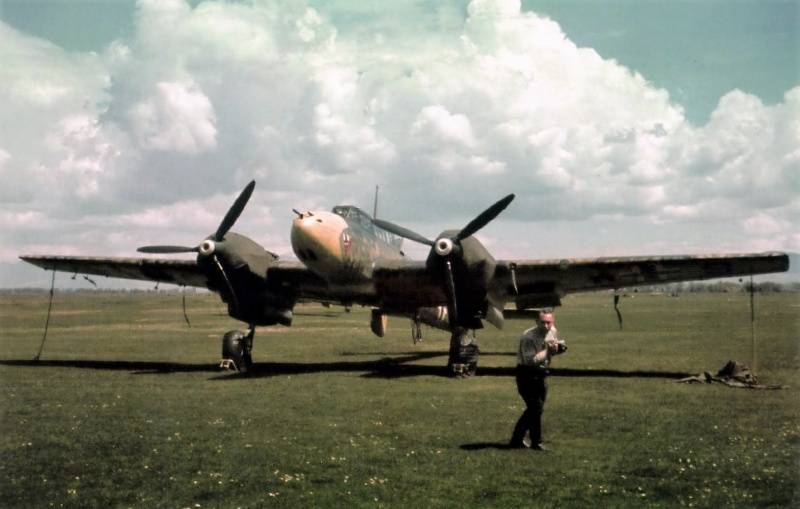
Bulgarian operation
In the spring and summer of 1944, Moscow repeatedly demanded that Sofia break its alliance with Germany. After the crushing victories of the Red Army in 1944, the defeat of the Germans in Moldova, the liberation of Romania and the withdrawal of the 3-th Ukrainian Front on the Romanian-Bulgarian border, Bulgaria had to make a choice. On 26 on August 1944, Sofia declared neutrality in the war between Germany and the USSR, and demanded the withdrawal of the German army from Bulgarian territory. However, the Germans continued to use the territory of Bulgaria to move their troops, German ships arrived in Bulgarian ports and German forces were stationed on Bulgarian land. Therefore, on September 5, the USSR declared war on Bulgaria, after which the Bulgarian authorities broke off relations with Hitler. On 8 of September, the troops of the 3-th Ukrainian Front began the Bulgarian operation. They did not meet the resistance of the Bulgarian army. On the night of 8 on 9 September, an uprising began in Sofia. On September 9, the power of the Patriotic Front was established in the country, headed by K. Georgiev. The leading positions in the Patriotic Front were occupied by the Communists and their supporters.
The government of the Patriotic Front declared war on Germany and Hungary, dismissed the parliament, the police (created the people's militia), undertook the purge of the state apparatus and the restructuring of the army, and banned Nazi organizations. War criminals were brought to justice. In Bulgaria, the monarchy was canceled as a result of a referendum. Switching to the side of the anti-fascist coalition allowed Bulgaria to maintain Southern Dobrudja. In the 1946 Bulgaria was headed by the “Bulgarian Lenin” - George Dimitrov, the country became part of the socialist camp.
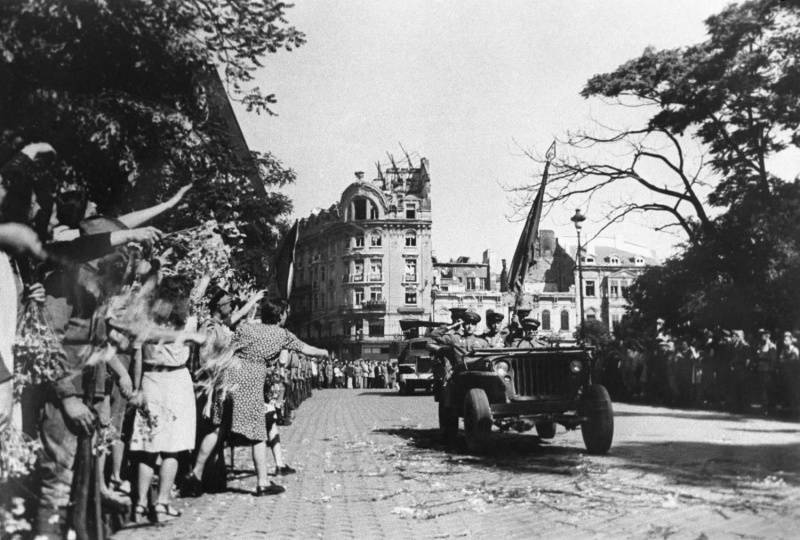
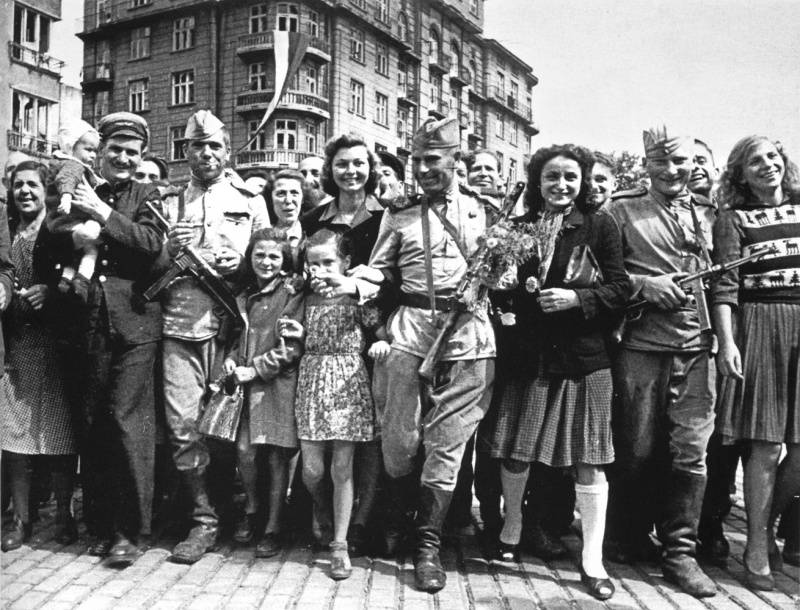
16-I Union Republic and the Bulgarian economic miracle at the expense of the Russians
After World War II, Bulgaria experienced a deep economic crisis. The country was exhausted, a significant part of the population was starving. However, with the help of the Soviet Union, Bulgaria from a poor agricultural country has become a highly developed economy, a socially prosperous society. It was a real “Bulgarian miracle”.
The total Bulgarian Gross National Product (GNP) for 40 of the post-war years has grown more than 14 times, per capita - almost 30 times. In the period from 1946 to 1986, about 80% of industrial capacities, more than a third of agricultural capacities, up to 90% of energy, 70% of the transport network, 80% of port infrastructure, more than 80% of the total area of housing, health facilities, education, science were created in Bulgaria and culture. All this was done at the expense of exclusively material, technical and financial assistance from the USSR, at the expense of Soviet personnel. And for free! In terms of modern prices, the USSR invested hundreds of billions of dollars in Bulgaria! It is also necessary to take into account compensation for the supply of Bulgarian goods to the Union: with the low cost of Bulgarian products, Moscow paid Sofia at rates close to world ones. For Bulgaria, prices for supplied Soviet goods were underestimated.
It is worth noting that the authority of the Soviet government in Bulgaria was very high. Since 1949, Sofia has repeatedly proposed to join the USSR on the rights of the 16 Republic. Unfortunately, Moscow, where decomposition processes began gradually after Stalin's death (which ultimately led to the rejection of socialism and the 1991 catastrophe of the year), did not dare to do so. The Soviet leadership was afraid of new complications with the West, a possible conflict with Turkey and a sharp reaction among other Balkan countries, in particular, Yugoslavia.
A developed socialist society was built in Bulgaria. Incomes of the population have grown significantly. About 40% of the GNP structure at the beginning of the 1980's was occupied by engineering, instrument making and machine tool building, ferrous metallurgy, the chemical industry and petrochemistry, electronics and electrical engineering. Agriculture became highly mechanized, which enabled Bulgaria already in the 60-ies to become one of Europe's largest exporters of vegetables and fruits (fresh and canned). The country has reached a high level of education, science and culture: there were 8,9 universities, 1986 state museums, 27 thousand public libraries, 185 theaters, etc., in 10,4 million people (in 55). An excellent resort and resort tourism (also mainly due to subsidies from the USSR).
Secretary General of the Bulgarian Communist Party Todor Zhivkov (1954 — 1989 gg.) Skillfully pursued domestic and foreign policy. He carried out frequent rotation of party and state leaders, there was no persecution of Orthodoxy, the private sector in agriculture was not limited, there was a rapid increase in living standards. Cultural, scientific and art workers were supported. This allowed us to maintain internal stability until the mid-80's. There was practically no internal opposition. In the external arena, Sofia supported Moscow in the confrontation with Beijing.
In the second half of the 80's, when preparations began for the collapse of the USSR and the socialist camp, the Romanian leader Ceausescu suggested Zhivkov create a Romanian-Bulgarian alliance with the involvement of the GDR and Albania, where the Stalinists still held power. The new union was to oppose the Gorbachev leadership, which consistently merged the socialist camp and the USSR. But Bulgaria did not dare to take such a sharp step. After Zhivkov’s resignation in 1989, prepared by the treacherous policies of the Gorbachev clique and the weakening of the USSR’s economic relations with Bulgaria, Bulgarian socialism fell.
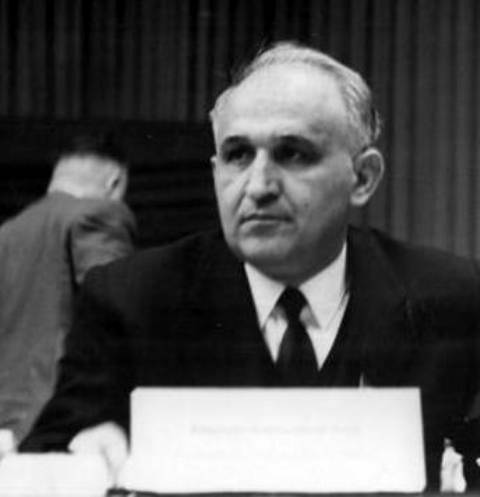
Bulgaria has no future in the framework of the “European Reich”
Further, the events in Bulgaria took place according to a well-established pattern: liberalization, currency devaluation, privatization (plunder and destruction of the national economy). A significant decrease in the standard of living of the bulk of the population, the emergence of a small group of "successful". Agrarian reform (transfer of land to former owners and their heirs) has led to the fragmentation of land into small plots and a sharp decline in agricultural production. Prices soared, people's living standards fell sharply, Bulgarian goods (industrial and agricultural) were not needed on the world market, production dipped sharply. Up to 70% of Bulgaria’s production capacities created with the help of the Union are idle or closed, stolen. Western Europe did not even need Bulgarian vegetables and fruits.
Bulgaria, in fact, has become a semi-colony of the West, under the control of "experts" to destroy competitors from the IMF and the World Bank. It became part of NATO and the EU. At the same time, the standard of living of the people has decreased by half compared to the middle of the 80-s, the country's production potential is almost destroyed. Now Bulgaria is a simple consumer within the EU. And Sofia is creeping before Brussels, begging for funding. There is little work, only in the tourism sector, but it is also seasonal. It is not surprising that the people are rapidly dying out, and young people are fleeing to the developed countries of the EU, occupying the position of people of the second or third grade, slaves in the "European Reich." So, over the past three decades, the population of Bulgaria has declined by almost a quarter, to 7 million people. At the same time, this demographic trend is only intensifying. In addition, there is a decrease in the number of Bulgarians, and there are more Turks and Gypsies.
The leading positions in power, economy and the press belong to a small pro-Western group (only a few percent of the population), but it is it that determines the political course of the country and the growth of Russophobic, anti-Soviet sentiments in society. Most Bulgarians still consider Russian brothers, but they do not determine the policies of Sofia. Hence the official Sofia’s desire to forget all the great good that Russia has done for Bulgaria and repaint white to black. Historians and publicists fulfill the state order: in every way they underestimate, cross out and denigrate the role of Russia in the history of Bulgaria.
Obviously, the present pro-Western Bulgaria has no future. The semi-colonial periphery of developed Western countries, a sales market and cheap labor, a springboard for NATO in the Balkans and against Russia, minor injections against Russians in foreign policy and the rapid extinction, aging and flight of the native Slavic population. As a result - the complete extinction and death of the national identity of the Slavic people.
Information